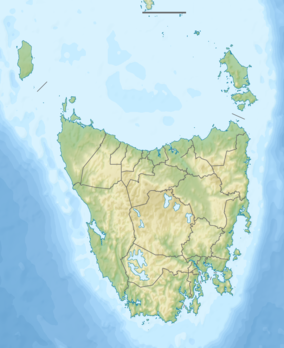Lake Mackintosh
Lake Mackintosh is a 17.5-kilometre-long (10.9 mi) reservoir with a surface area of 3,100-hectare (7,700-acre) that forms part of the Pieman power development running north–south past Mount Farrell, adjacent to the town of Tullah in Tasmania.
| Lake Mackintosh | |
|---|---|
 Lake Mackintosh | |
Map showing Lake Mackintosh in Tasmania | |
| Location | Tullah, Tasmania |
| Coordinates | 41°41′S 145°40′E |
| Type | Reservoir |
| Part of | Pieman power development |
| River sources |
|
| Basin countries | Australia |
| First flooded | 1980s |
| Max. length | 17.5 km (10.9 mi) |
| Max. width | 3.5 km (2.2 mi) |
| Surface area | 3,100 ha (7,700 acres) |
| Max. depth | 65 m (213 ft) |
| Shore length1 | 83 km (52 mi) |
| Surface elevation | 229.5 m (753 ft) AHD |
| Islands | 3 large, 5 small islets |
| References | [1] |
| 1 Shore length is not a well-defined measure. | |
Features
Fed by the damming of the Mackintosh, Sophia, Fury, Southwell, and Brougham rivers and Mackintosh Creek, water from the lake feeds Mackintosh Power Station through Lake Rosebery.[2]
The lake was created in the 1980s and the main basin of the lake was originally a Button Grass swamp prior to inundation.
Lake Mackintosh is impounded by two dams, the main Mackintosh Dam and the smaller Tullabardine Dam. The lake's deepest point is roughly 60 metres (200 ft) deep at the base of the main dam. It is one of the larger sized water impoundments of the Pieman power scheme.[3]
The Murchison River feeds into Lake Mackintosh through the Murchison Dam, to the south. The Murchison Highway borders the lake to the west.
The Cradle Mountain-Lake St Clair National Park as a component part of the Tasmanian Wilderness World Heritage Area, has its western boundary lying to the east of the lake shores.
References
- "Map of Lake Mackintosh, TAS". Bonzle Digital Atlas of Australia. n.d. Retrieved 25 May 2018.
- "Lake Mackintosh". Discover Tasmania. 2018. Retrieved 25 May 2018.
- "Tasmanian Wilderness World Heritage Area and Surrounding Land Use 2007" (PDF) (Map). Department of the Environment, Water, Heritage and the Arts. Commonwealth of Australia. 2008. Archived from the original (PDF) on 9 March 2010. Retrieved 25 May 2018.